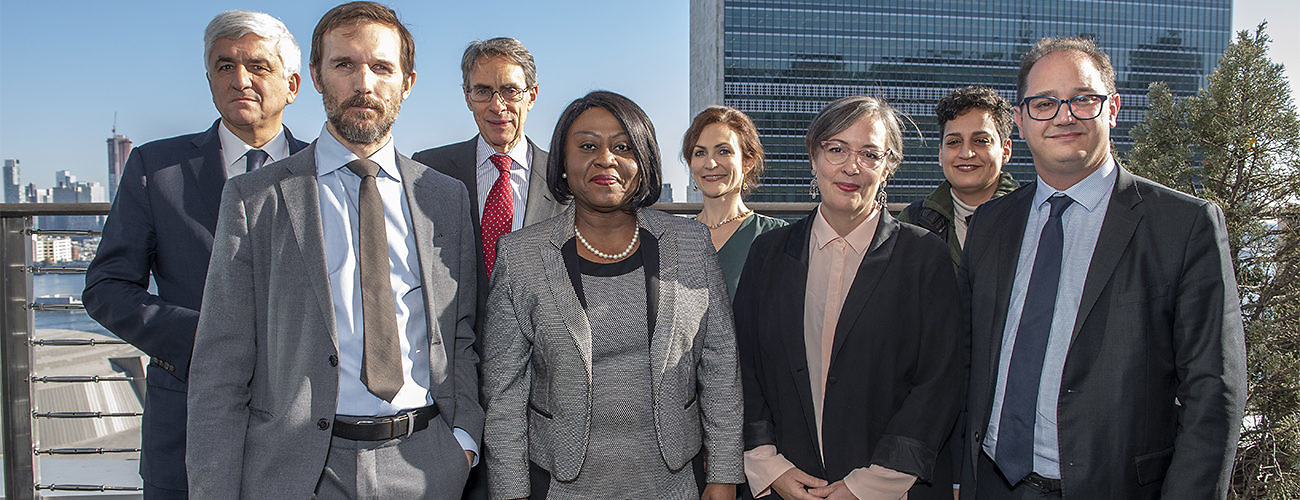On November 21st, IPI and the Normandy Region co-hosted a policy forum on the importance of inclusion and human rights in building lasting, durable, and sustained peace, with a particular emphasis on the importance of women’s participation in peace processes and international mediation.
The Normandy Region launched the Normandy for Peace Initiative in 2017, and it organizes a forum for peace in Normandy, France, each year. Last year’s second annual forum attracted 250 speakers from 50 different countries, and organizers are planning the third for June 3rd, 4th and 5th of this year just before the celebrations of the 76th anniversary of the D-Day landings and the Battle of Normandy.
François-Xavier Priollaud, Vice-President of the Normandy Region, said that the best way to honor the generation that liberated Europe from the Nazis 75 years ago was to build a durable, inclusive peace that enshrined human rights. “Sustainable peace is not just peace through peace treaties,” he said. “It’s the concept of democracy, it’s the vision of multilateralism, and we need to make sure that the sustainable solutions are always coming out of dialogue.”
He said that Normandy for Peace was based on “four pillars. We have a campus for youth learning to solve and diffuse conflict. We have an annual award for liberty. There is also the Normandy for Peace Library, which is a resources center online. The fourth area is dedicated to art, science, and culture. These pillars of peace put men and women at the heart of the solution.”
Hervé Morin, President of the Normandy Region and former French Defense Minister, singled out climate change and inequality as drivers of conflict. “When you talk about sustainable peace, there is one topic we only talk about in part, which is inequality—in nations, within mankind, firstly between nations.” He argued that the current large migrations from the global south were prompted by inequality, “but tomorrow they will be triggered by the issue of climate change. The hope is that one day we’ll stop with nice statements, declarations, and statements of principles and give official development aid.” As for the persisting inequality of women, he declared, “Whenever women play a key role in society, societies are wealthier and healthier. Whenever women play a real role, peace wins and war loses.”
Martha Ama Akyaa Pobee, Permanent Representative of Ghana to the United Nations, acknowledged the gains that Mr. Morin cited but lamented, “With all these potential benefits, one wonders why the situation is as it is today, being that there are fewer women mediators, there are fewer women in peacekeeping or in negotiating peace agreements. Peace agreements fail to make reference to women or address concerns such as gender balance.”
She referenced her own involvement in the African Women Leaders Network and said there needed to be many more such networks, all communicating with one another and building partnerships with local groups acting to prevent conflict and otherwise promote the Women, Peace and Security (WPS) agenda. “Meaningful participation of women in peace is not just about increasing their numbers in processes,” she said. “We must deal with real qualitative representation. This is to ensure that their rights, needs, and experiences are properly reflected in reconstruction processes. Studies have shown that inclusion of women in peace processes is critical.”
IPI Senior Fellow Sarah Taylor cited instances around the world in places like Yemen, Syria, Libya, Mali, and Sudan where women were actively involved in advocating for political change and negotiating for life-saving humanitarian access yet not included in the peacemaking process. “In the Central African Republic, despite sexual violence being fundamental to the violence that country continues to experience, and despite the mobilization of women leaders at every level, women were virtually excluded from recent peace talks and were—as in so many other cases—brought into the discussion only at the tail end,” she said. In other examples, Libyan women were let into peace talks only “through sheer resistance and at the last minute,” and women from Mali flew themselves to peace talks in 2012. In Afghanistan, she noted, “women have been called ‘pet rocks’ for which the rucksack of peace does not have space.”
She said there was no one solution but suggested some “creative mechanisms” to increase women’s participation like the “the ecosystem approach. Let’s not place all of women’s participation in one basket. Let’s deploy resources across the board so that ‘participation’ is not one woman who has all the expectations upon her.” She also advised setting quotas and strengthening accountability to the commitments of the WPS agenda.
Kenneth Roth, Executive Director of Human Rights Watch, critiqued what he called a “narrow perspective of making peace,” where mediators feel that human rights concerns can complicate reaching peace settlements and should therefore be put off until after the peace is struck. To the contrary, he said, “we know that justice at least sometimes is a deterrent for the kinds of atrocities that fuel and perpetuate conflict. We’ve seen this in many cases where leaders go out of their way to avoid the possibility of justice and fight tooth and nail to prevent this from happening. Even though I would never say that international justice will always work as a deterrent, if you nonetheless can stop an occasional genocide, mass atrocity, that’s worth doing in and of itself.”
On the need for including women in peace processes, he warned against tokenism or, as he put it, taking “the Margaret Thatcher approach. I don’t believe having a woman in the room magically makes things better, but in Afghanistan where a key issue is will the Taliban re-impose gender discriminatory policies, how you can decide the future without women in the room is just crazy.”
Jake Sherman, Director of IPI’s Brian Urquhart Center for Peace Operations, moderated the discussion.
Live coverage of the event in French can be found on the IPI Francophone page.








